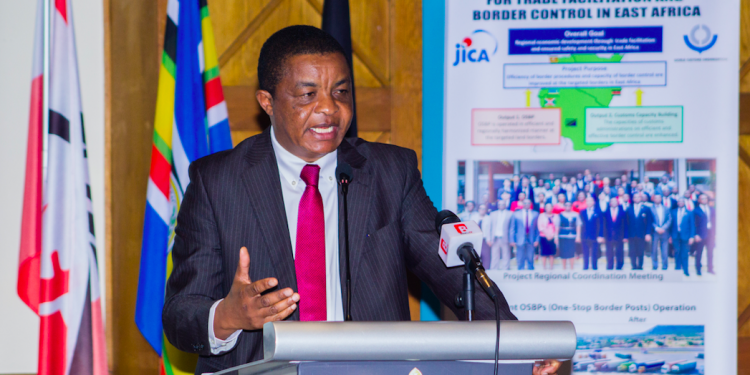Eastern African revenue authorities have been urged to come up with more innovative ways of addressing emerging customs revenue policy and administrative challenges.
The Kenya Revenue Authority commissioner general John Njiraini called upon his counterparts to continue devoting their best efforts for the betterment of revenue mobilisation and development of the member states.
“We should have Information Systems compatibility to give us visibility of across the systems platforms to monitor and track the goods declaration and clearance processes across our borders,” Mr Njiraini said during a two-day 45th East African Revenue Authorities Commissioners General (EARACGs) and the Regional Joint Coordination Committee (RJCC) meeting taking place at Intercontinental Hotel, Nairobi.
The meeting, hosted by KRA, brought together Commissioners General from the region and the Japan International Cooperation Agency (JICA) as well as the Japan’s Ministry of Finance.
Part of the agenda to be deliberate include harmonisation of tax regimes in the region aimed at fostering competitiveness, employment, and further contribute to the sustainability of public finances and eventually economic growth in the region.
EARATC assists the Commissioners General in identifying challenges, carry out studies and analyse technical issues in tax administration and providing appropriately researched recommendations in line with international best practice and subsequently ensure implementation of the agreed recommendations.
Ms. Keiko Sano, Chief representative, JICA Kenya Office said the Government of Japan officially announced its commitment to support for OSBP development in Africa during the 4th Tokyo International Conference on African Development (TICAD IV) held in 2008.
“Since then, JICA has been deeply involved in OSBP development including funding the detailed design and construction of OSBP at Namanga, together with technical cooperation for its operationalization and capacity building,” said Ms Keiko.
 Ms. Brendah Mundia, Deputy Director, Capacity Building, World Customs Organisation noted that Customs, working with other border agencies, plays a pivotal role in facilitating trade and travel and securing the borders among other roles fiscal and non-fiscal roles. “It is, therefore, essential for Customs to take the lead in consolidating and further amplifying the ongoing efforts to ease the flow of goods and people across borders, thus turning globalization into a positive force,” she said.
Ms. Brendah Mundia, Deputy Director, Capacity Building, World Customs Organisation noted that Customs, working with other border agencies, plays a pivotal role in facilitating trade and travel and securing the borders among other roles fiscal and non-fiscal roles. “It is, therefore, essential for Customs to take the lead in consolidating and further amplifying the ongoing efforts to ease the flow of goods and people across borders, thus turning globalization into a positive force,” she said.
The EARATC’s key achievements in the past few years include the annual publication of the Regional Comparative Revenue Report, Performance Based Pay, Succession Management Framework, Technical Assistance to South Sudan in establishing her revenue administration, Study and Analysis of Production Sharing Agreements, identification of inadequacies in the laws targeting Mining Sector and Gas and Petroleum (Extractive industry), TADAT assessment in Revenue Authorities, Talent optimization, Establishment of the Rulings Database on decisions taken by Courts or Tribunals that affect Revenue Collection.
Other achievements include addressing Emerging Concern on Increased Volume of Transit of Sensitive Goods through Kenya and Tanzania to non-EAC countries, Harmonization of Tax Procedures, Establishment of Forensic Laboratories, Tax payment through Electronic Devices, Formation of International Tax Offices, Taxation of Multinational Corporations, and making Revenue Authorities to be a Single Revenue Collector.




